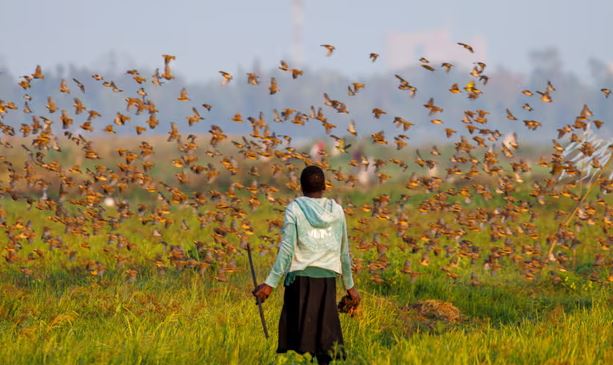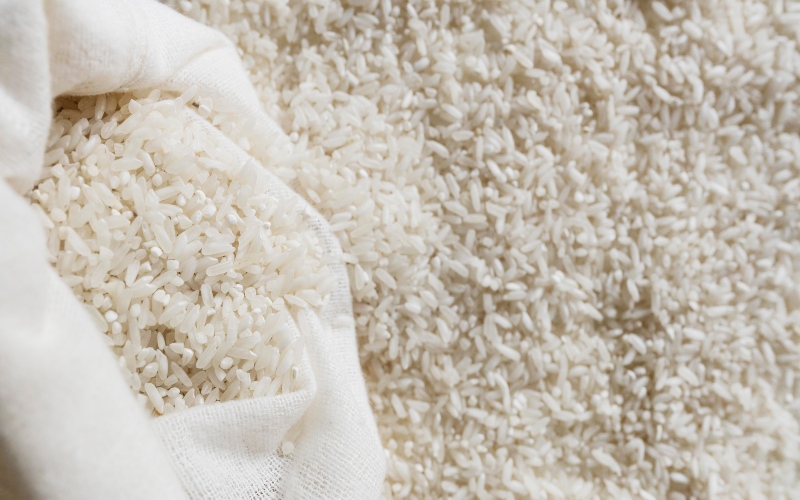Quelea birds wreak havoc on farms in Narok, Nakuru counties

For months, these small but destructive creatures have been swarming the vast wheat fields of Tipis in Narok County, causing severe damage to crops.
Farmers in the rural areas of Narok and Nakuru counties are battling an unexpected and relentless foe, quelea birds, often referred to as the world's most hated bird.
For months, these small but destructive creatures have been swarming the vast wheat fields of Tipis in Narok County, causing severe damage to crops.
One farmer, Ezekiel Ngarara as reported by Daily Nation has been particularly hard-hit. His 10-acre wheat farm, once a source of pride and livelihood, has turned into a battleground.
"I have never experienced anything like this. These birds have no mercy. They come in their thousands and they destroy everything in their path. You can hear them, and when they land, it's like a storm," Ngarara said, describing the overwhelming presence of the birds.
In an effort to protect his crops, Ngarara has employed several tactics.
His farm is dotted with scarecrows, and young men are stationed throughout the fields armed with vuvuzelas to create a continuous barrage of noise.
The shrill sounds are intended to disturb the feeding patterns of the birds. Despite the efforts, the quelea birds are proving to be undeterred.
"For a month, I tried everything to scare them off scarecrows, loud sounds, even throwing stones but nothing worked. So, I hired a few young men to blow vuvuzelas all day long to try and keep the birds at bay. But it's exhausting and costly. Every day, I have to pay them Sh500 each," he explained.
The destruction caused by the quelea birds has been devastating for many farmers in the region.
Another farmer, Joshua Cheruyiot, has faced similar losses.
His 15-acre wheat farm has been overrun by the birds, and his frustration is compounded by the weight of his responsibility.
"If I lost this harvest, it would be devastating for us. My children depend on this income for school fees, and I'm the sole breadwinner," Cheruyiot shared.
Devastating effect
The Ministry of Agriculture has estimated that quelea bird flocks, which can number between one and five million, are capable of consuming up to 50 tonnes of grain in just one day.
Native to sub-Saharan Africa, the quelea is the world's most populous bird species. Although small, weighing between 15 and 27 grams, these birds consume up to 10 grams of plant seeds daily.
Other Topics To Read
When they swarm in such vast numbers, they can completely decimate a farm's crop.
Agriculture Principal Secretary Paul Ronoh acknowledged the severe impact of the invasion and revealed the government's response.
"We're launching a five-day aerial spraying exercise to control the birds in this area that straddles Narok and Nakuru counties. Close to 2,500 farmers are affected by the pests. Last year, the invasion was not as much compared to this year," Ronoh said.
The government's plan involves the use of drones equipped with spraying systems designed to release avicides, chemicals intended to kill the birds.
This method of aerial spraying is more efficient and targeted compared to traditional methods, which require larger teams and resources.
The drones fly over the affected fields, dispensing precise amounts of pesticide to ensure the birds are controlled before they can cause further damage.
While this new strategy offers hope for farmers, the challenge is far from over.
Unpredictable
The quelea birds are highly mobile, making it difficult to predict where the next attack will occur.
Dr Ronoh noted that farmers have already lost nearly 70 per cent of their crops this year due to the persistent bird invasions.
A recent report by the Food and Agriculture Organization (FAO) in March 2024 explained that quelea bird migration is influenced by the seasons, with the birds migrating from dry areas to those with rainfall.
This movement coincides with the availability of mature grass seed in the fields, leaving food crops vulnerable to attack.
The consequences of the quelea invasion are not just local but national. Kenya, which relies heavily on wheat imports to meet local demand, has seen an increase in wheat importation in recent years.
According to the Kenya National Bureau of Statistics, the country imported a significant amount of wheat in 2023, following a reduction in the import duty to 10 per cent by the National Treasury.
As farmers continue to battle the quelea threat, the government's intervention through drone spraying offers a potential lifeline, but the situation remains dire.
The fight to protect Kenya's wheat fields from the world's most destructive bird species is far from over.
Top Stories Today












































